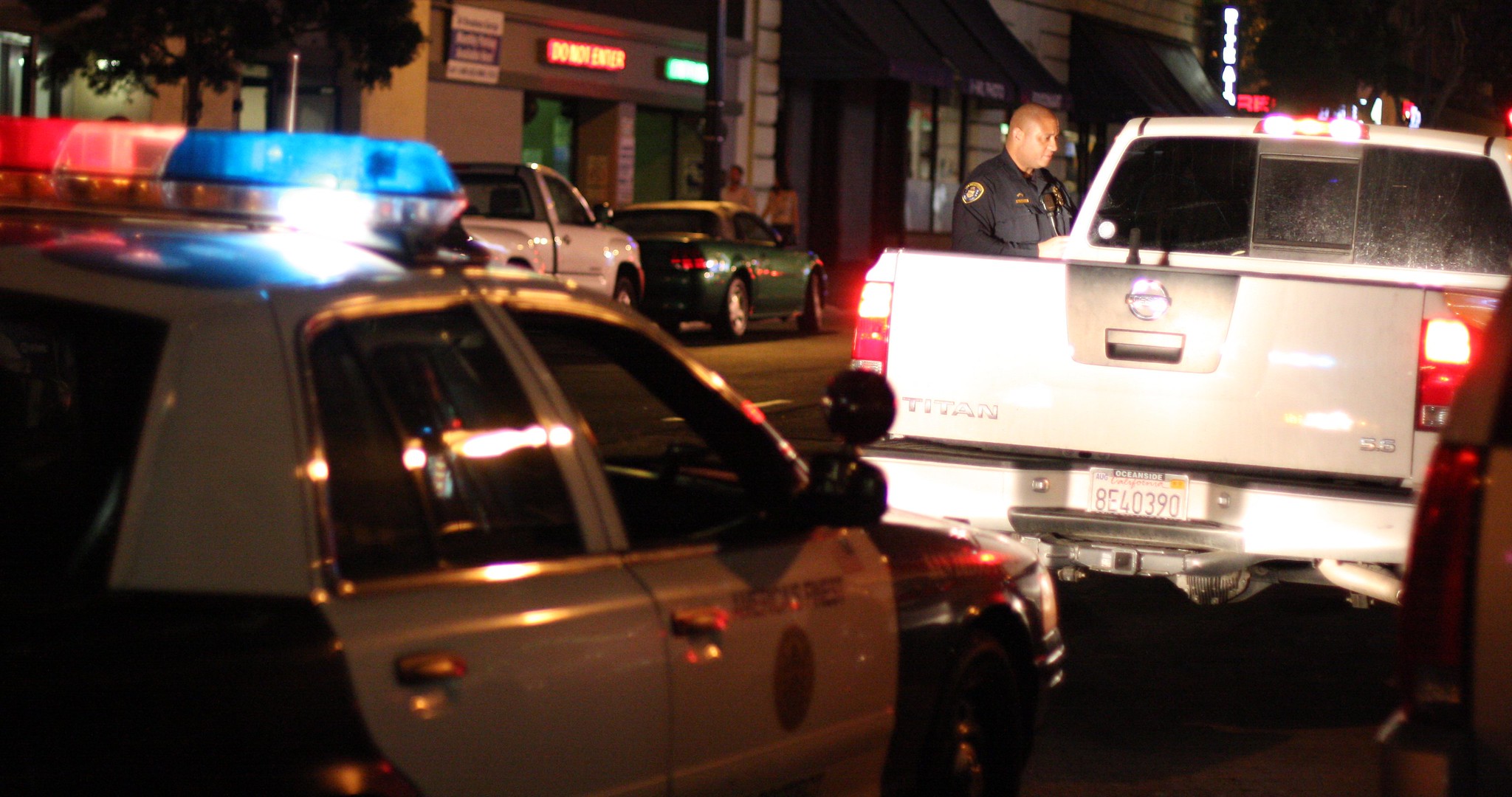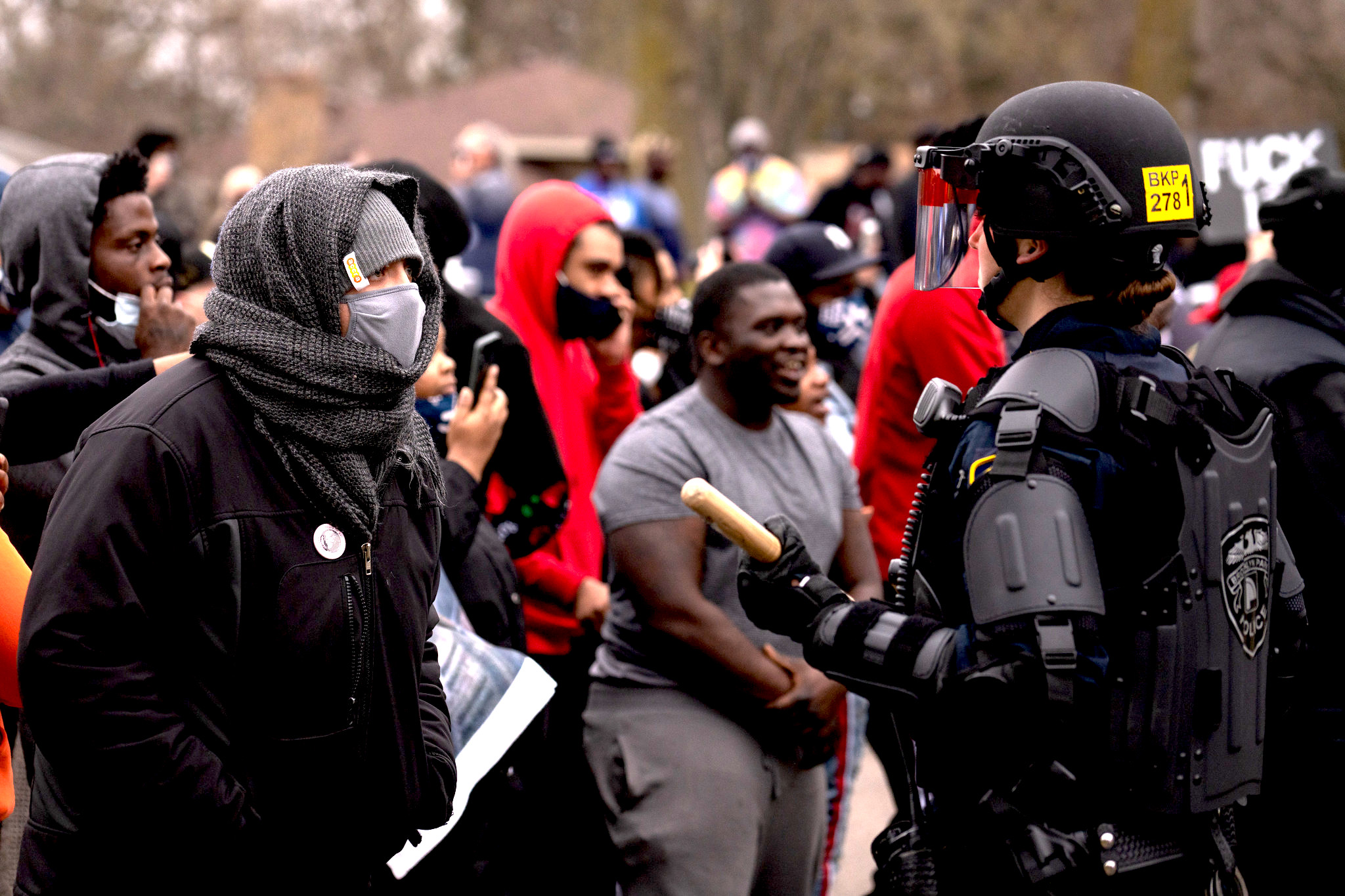On the heels of the police killing of Daunte Wright during a traffic stop, Samantha Schuyler reports on an ACLU study showing law enforcers’ incentives to punish as many people as possible.
By Samantha Schuyler
The Appeal
When Brooklyn Center, Minnesota, police killed 20-year-old Daunte Wright during a traffic stop on April 11, his name joined a growing list of Black drivers killed after being pulled over for an infraction that constituted no threat to public safety.
In Wright’s case, he was pulled over for driving a car with an expired registration — an issue many drivers experienced as Minnesota’s motor vehicle department adjusted to limited services during the Covid-19 pandemic — and for an air freshener dangling from his rear-view mirror, which is illegal in Minnesota.
According to a report from the ACLU released this week, Wright’s experience is more than just common; the policing of minor infractions, including nonpayment of fines or fees, is considered a significant source of revenue for local governments. The criminal legal system, the authors write, “relies heavily on collecting money from the very people targeted by the system,” in the process incentivizing police to punish as many people as possible.
Cycle of Fees & Warrants
For the victims of such police activity, however, the fines and fees extracted from these kinds of stops themselves can create an unmanageable burden, and the failure to pay often results in a cycle of increased fees or warrants. “You see it over and over again. Governments are strapped for cash, the first thing they do is create either new categories of fines and fees, or increase the dollar amounts attached to existing fines and fees,” said Emily Dindial, advocacy and policy counsel at the ACLU and co-author of the report.
For example, the report refers to a study by the Department of Justice in 2015, which found that 23 percent of total municipal revenue in Ferguson, Missouri, came from fines and fees.
The Florida Clerk of Courts Operations Corporations estimated that at least $20.8 million of its revenue came from the payment of license suspension debt.
“The creation of all these offenses … create these regulations that have to be enforced; they make it so everyone is constantly breaking the law or out of regulation. They generate revenue by over-policing,” Dindial said.
According to the report, not being able to pay a fine frequently sets off a snowball effect of mounting fees that can end in thousands of dollars of debt or the suspension of a driver’s license.Many people are forced to choose between driving anyway (thereby committing a new crime) or trying to get by without a car.
For instance, the authors of the report found that each year, over 100,000 Coloradans lose their licenses because of unpaid traffic debt or failure to appear in court.
In 2019, Florida issued 1.2 million license suspension notices, 70 percent of which stemmed from the failure to pay fines and fees.
Brooklyn Center, Minn.: Protesters gather on April 11 after a Brooklyn Park police officer shot and killed 20-year-old Daunte Wright. (Chad Davis, Flickr, CC BY 2.0)
‘Self-Defeating System’
“The system itself is self-defeating,” said Emily Greytak, the ACLU’s director of research and co-author of the report. “Most people use their cars as part of their work, or to drive to work — a suspended license takes away their livelihood, yet that’s what they need to pay the fees.”
In one case cited in the report, Dario, from Colorado, was pulled over for driving with windows that were tinted too darkly, fined $75, then given a $150 ticket for driving without a registration. But with 13 additional fees, Dario ultimately owed $1,032.
“The ability to pay competes with the cost of rent and cost of food and daily expenses,” Dario told the researchers. “So it’s like, either pay the traffic fines, or pay for food.”
According to Greytak, the interviewees were well aware that not having money was the actual crime. “At least 11 million people are not allowed to drive simply because they cannot afford to pay fines and fees, while people who can afford to pay are spared,” the report reads. “The brunt of these policies falls disproportionately on people of color, contributing to existing racial disparities in the criminal legal system.”
Daunte Wright had a warrant out for his arrest because he did not show up for a court appearance for two misdemeanors, which were not related to driving. Skipping court appearances is common for people who are unable to pay fines and fees.
For anyone with a warrant hanging over them despite committing no dangerous or serious crimes, minor infractions often become dangerous and sometimes deadly. In 2016, according to the report, 95 percent of all arrest warrants issued in Texas were for unpaid fines and fees, sending more than 640,000 people to jail. In 2020, the report reads, one out of every seven adults in New Orleans had open warrants; the city vacated about 55,000 warrants that year, most of which were issued for nonpayment or failure to appear in court for a fine-only offense. Thirty-six percent of those with warrants were Black.
And last year, the Las Vegas Justice Court in Clark County, Nevada, reported 270,000 open warrants for unpaid traffic tickets and failure to appear in court to resolve those tickets.
According to Dindial and Greytak, these policies do not improve public safety. Moreover, the report questioned if such policies, after accounting for the costs of enforcement and collection, generate that much revenue.
“It makes no logical sense if you’re talking about public safety; it makes no logical sense if you’re talking about fiscal concerns,” Dindial said. “So ‘Why are they doing it?’ is a natural next question.”
This article is from The Appeal, a non-profit media organization that produces news and commentary on how policy, politics, and the legal system affect America’s most vulnerable people.





The System is stacked against the poor for sure. But who made the law for instance on “no dangling objects from car windshields?”. I looked it up. It is contained in State Statute 169.71. Promulgated in 2008. So it was voted on by elected representatives. The current chair of the transportation committee is Frank Hornstein (Democrat/DFL). So why blame the police? All traffic and criminal law have enforcement provisions. All courts have a bench warrant system for non compliance with court rulings. These 134 people who sit in the legislature have the ability to reform the entire State. Why don’t they? Where does the inertia come from?
Great appreciation to Samantha Schuyler for this article which very clearly exposes another aspect of the role that money plays in our “justice” system.
On the face of it, money is a consistent advantage, both in avoiding legal scrutiny to begin with and in prevailing in court.
Any “Justice” system which is essentially premised on protecting the status quo, as the U$ system is, that is, protecting wealth, power, and privilege over honestly seeking genuine justice for all members of society, is corrupt, and corrupting, from the onset.
We pride ourselves on our Rule of Law, yet what this article reveals is the rule of money, be it the petty but devastating abuse of law “enforcement” to fill municipal coffers, the equally abysive confiscation of money and property through “asset forfeiture”, and that the “quality” of “legal representation” is directly tied to wealth.
I hope that this article might offer the opportunity of beginning a serious discussion, long necessary, of the baked-in unfairness and indifference, bordering on the depraved, that is our justice system.
As we cannot fail to see the brutality of the police and the apparent official indifference to that brutality and killing which has characterized this “justice” system, from the beginning, so too must we acknowledge that excessive policing is not simply harassment, it is sanctioned official governmental belligerence, reflecting a profound nonchalance on the part of the political class, the legal profession, academia, and the media – all of which have, somehow, continually been unable and unwilling to recognize and change the underlying dishonesty of the “justice” system, from the very beginnings of the republic.
“It makes no logical sense if you’re talking about public safety; it makes no logical sense if you’re talking about fiscal concerns,” Dindial said. “So ‘Why are they doing it?’ is a natural next question.”
The answer to that is easy: Governments at all levels are strapped for cash because the wealthy essentially pay no taxes in this country, so the burden must be passed on in some way, shape or form to the little people, those without power or money. In this country, you must have money to make money… or to hang on to the little money you may possess. Money always flows from those who have little to those who have a lot, from those who need it most to those who need it least. Sounds like a system designed by the Devil himself, does it not?
Nope. “Governments…strapped for cash” is a fiscal concern. Try again.
I think it IS WHY the apex capitalists choose to do so, not that it MUST be so for fiscal reasons. The elite have most of the money, so that is no consequence to them. They COULD be generous and pay much more than their “fair share.” But to enforce their full spectrum superior status they make the 99% suffer more and pay for everything. They prefer to beggar the governments and use that as an excuse to stick it to the lower castes. They deliberately use “fiscal concerns” as an all encompassing persistent cudgel against their “inferiors.”
“…[B]ecause the wealthy essentially pay no taxes..” is the important part. These policing practices help enforce the class system (often through the structural racism that stands in for class in the US). They may not make a huge amount of money when the costs of cops and bureaucracts are taken into account, but they help enforce the system responsible for transferring the wealth created by the many into the pockets of a billionaire few.
You need some help buddy. Fiscal: pertaining to the public treasury or revenues. There’s nothing in that definition about the source of the revenues. As the article says, 23% of Ferguson’s city revenues came from traffic fines. Ferguson’s revenues could have come from taxing city residents instead but, as realist points out, the wealthy don’t pay taxes. You’re the one that needs to Try again.